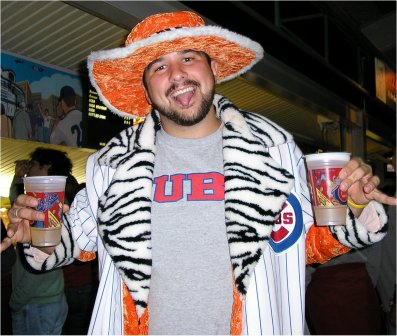The year is 1994 and like most six-year-olds, I climb out of bed at a late hour. It feels late to me, maybe 9:00 or 9:30. I know which days to get out of bed and which days to stay put. My parents would just shoo me back upstairs and tell me to go to bed, but they're out tonight. My 16-year-old sister is "babysitting," which consists of waiting a couple of hours until my brother and I fall asleep, make sure we're tucked in, and then do whatever she wants. She babysat us frequently, about once a month.
These are the days I wait for. I know to get out of bed and quietly tip-toe down the edge of the stairs. Five steps down and I can peer over the stair railing and watch the TV. A cartoon is on, it doesn't matter which one, I like all cartoons. Had my parents been downstairs, I would have watched for a minute and quietly went back up the stairs, hoping they wouldn't hear me. With my sister it's different -- she caves easier. I slowly continue my trek down the stairs and rub my eyes for effect. "Could you not sleep?" she asks me, and I say "No, I couldn't." This is usually all it takes. She allows me to sit next to her and watch TV until I fall back asleep. Just like that, my first viewing of Beavis and Butt-head. My parents would never have allowed me to stay up, I thought, let alone watch a show like this.
I never understood the appeal of Beavis and Butt-head, partially because I was too young to know what half the jokes meant. Another part of me found them annoying. I couldn't stand the constant laughing and grunting and snickering. I heard enough of those sounds in school. When I watched TV I wanted to get away from them and experience something new. As I got older, Beavis and Butt-head began to grow on me, but mostly for artificial reasons. It was labelled a "cool" show and I wanted to be a "cool" kid. So I watched with my friends and laughed at the jokes I didn't understand and laughed at the jokes I didn't find funny. Then I turned ten, approaching the age when this show would have resonated with me, but Beavis and Butt-head was cancelled in November of 1997. I missed the boat by a couple of years.
Through my teen years, I became acquainted with the show through reruns of various episodes and the movie. Creator Mike Judge was now working on King of the Hill, a show I adored. Seventeen years removed from my initial thrilling and blurry-eyed experience, Beavis and Butt-head is back on MTV. It premiered yesterday, sporting the same formula that made is successful. Beavis and Butt-head was always a character-driven show, allowing our two anti-heroes to make magic out of events we'd usually find too unbelievable or mundane to be funny. Yesterday, the boys goaded a homeless man, who they believed to be a zombie, into biting them. In their minds, this would give them the suave, female seduction powers seen in Twilight. They riddled away in a hospital bed with Hepatitis A, B, C, and just about every other known virus. Later, Beavis found an onion in his chili dog. He closely inspected the onion, causing his eyes to water. This conveniently occurs during an episode of The Bachelor. For the rest of the episode, Butt-head makes it a point to let everyone know Beavis cried during The Bachelor, which Beavis vehemently denies. It sounds stupid, and it is, but the formula continues to work.
Beavis and Butt-head built its reputation on the legitimately hilarious music video sequences. Beavis and Butt-head confine themselves to the couch, and watch and comment on the popular music videos of the day. The show again lucks out because this is an easy blueprint to replicate -- they simply replace Alice in Chains and the "Safety Dance" with LMFAO and the cast of Jersey Shore. The show will undoubtedly find a new niche audience and even pull back some of the 20 and 30-somethings, but will it still resonate with teenagers like it once did?
We're in an age of Twitter, Facebook, and personalized blogs. Kids have platforms now that were not available to them in 1993 when this show initially aired. If people want to share their opinions, it's pretty easy in 2011. Whether or not others are listening is besides the point. Blogs and social networks have at least created the illusion that everyone's thoughts are important. Why else would someone twitpic what they had for lunch, or post on their wall about how so-and-so fucked them over? Gone are the days of sitting on the couch and complaints falling on deaf ears. Teenagers take to the Internet to voice their opinions and frustrations of everyday life. The fact that these words show up and are stored in cyberspace give them more meaning than a soundbite, unrecorded and forgotten.
Beavis and Butt-head aired from 1993-1997, before social networks and widespread blogging. The Internet was just starting to find its way into households. Most of us were probably too preoccupied with trying to figure out what the Internet was to even fathom where it was going. The generation of teenagers who were watching Beavis and Butt-head could relate to lounging around and making fun of the absurdity of the world around them. Criticisms of things as simple as music videos sometimes turned into critiques of politics and human behavior. It must have been comforting to see two cartoon kids on the TV, albeit immature and over-the-top, mimicking the thoughts and behaviors of real-life teenagers. Imagine having only the newspapers and talking heads as opinion-makers. Nowadays, we can get our information from a variety of sources we consider reasonable. In 1993, Beavis and Butt-head were relatable when most news outlets were not talking about the things teenagers wanted to talk about.
If the first episode is any indication, Beavis and Butt-head will be just as funny as it was the first go around. However, I doubt present day teenage life will allow for it to reach the iconic status it did under the previous generation. I suppose that wasn't the point of bringing it back anyway. Instead of a show representative of teenage life, it will likely fall into the quickly discussed and discarded bin that so many subjects do in today's fast-paced information cycle. I, for one, am happy to at least be awake and old enough to understand what's going on this time.

















